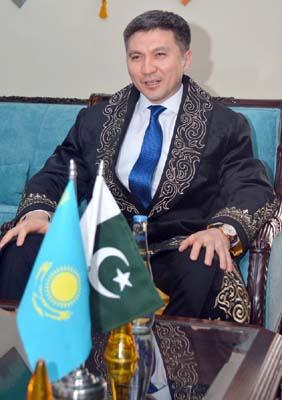
French traveler explores Kazakhstan’s rich and diverse culture
Astana: Richard Martin, a French engineer, shifted from a full-time job in the United States during the pandemic in 2020 to become a traveler. He has recently arrived in Kazakhstan, where his vlog documenting Astana has been gaining popularity.
In an interview with the Astana Times, Martin shared insights into the country, Kazakh culture, and his plans.
Having previously worked as an engineer on electric propulsion systems for marine vessels worldwide, Martin decided to embrace a nomadic lifestyle, and explore diverse cultures, particularly those under-represented in mainstream Western media.

“I extensively traveled for work, designing, engineering, and commissioning electric propulsion systems for ships worldwide, contributing to energy, renewables, and oil and gas projects from South Korea to Canada, Netherlands, Japan, Egypt, the United Kingdom, the United States, Malta, the United Arab Emirates, and more,” he said.
Martin, whose main YouTube channel titled Oops I Moved Again, is dedicated to documenting his travels through social media including Instagram, TikTok, Facebook, and his newsletter at oopsimovedagain.com. He also creates educational content related to Science, Technology, Engineering, and Mathematics (STEM) on his second YouTube channel – I Teach While Traveling.
While this was his first visit to Kazakhstan, Martin had encountered Kazakh people in the United States and France. He aims to delve into Kazakh culture, understand the diversity of its people, and share his experiences globally through social media and newsletters.
Martin expressed a keen interest in understanding Kazakhstan’s history from the post-World War II era until its independence in 1991.
“I decided to visit Kazakhstan to learn further about its history and people in the most genuine way, starting with your historic figures such as Kerey and Zhanibek Khans, founders of the Kazakh Khanate. Rakhimzhan Koshkarbayev, a Kazakh man, who raised one of the flags over the Reichstag during World War II, Queen Tomiris, Al-Farabi, (…) and other people. I spent hours learning about their stories, and the importance they represent to the people of Kazakhstan,” he said.
Upon arrival in Kazakhstan, Martin was pleasantly surprised by the rich ethnic and religious diversity within the country. The country embraces multiple religions, including Orthodox Christianity, Judaism, and Islam.
Martin praised Astana’s innovative infrastructure, describing it as a city reminiscent of Disneyland.
“I was also impressed with the city’s digital infrastructure. The seamless internet connectivity and the prevalence of ride-sharing and food delivery apps contribute to the city’s comfort and modernity. This digital landscape not only enhances life in Astana but also opens up new opportunities for the city and Kazakhstan,” he said.
Martin emphasized that traveling taught him to abandon expectations, enjoy life’s uncertainties, and appreciate both the good and challenging aspects.
He noted the kindness, hospitality, and communal spirit of people, noting Kazakh grandmothers’ role in educating their grandchildren.
“The local Kazakh lifestyle, focused on family and friendship, stands out. Unlike in Europe or North America, I observed that Kazakh grandmothers contribute to their grandchildren’s education. This involvement differs from the more typical grandparents role in other countries, where grandparents often indulge grandchildren in amusement parks, cafes, and various gifts, leaving the educational responsibility primarily to the parents,” he said.
Martin expressed admiration for Kazakh cuisine, with its light and balanced offerings, and expressed a desire to immerse himself in the nomadic life of the Turkic and Kazakh tribes.
“Beshbarmak and the unique experience of tea mixed with milk and tary [a millet] were particular highlights. I hope to visit a village or a place where I can truly immerse myself into the nomadic life of the Turkic tribes and Kazakh tribes as they lived thousands of years,” he said.
Reflecting on his travel and work experiences, where he conducted projects in various challenging conditions worldwide, Martin emphasized his readiness to face difficulties.
“I have encountered tough and challenging work and life situations, and I think that my travels have equipped me with patience and a certain sense of adaptation to various unexpected situations,” he said.
Martin shared his upcoming plans, including exploring Astana, visiting the Soviet Gulag (Chief Administration of Corrective Labour Camps), experiencing life in Karagandy, exploring Almaty and its surroundings, and visiting Turkistan and Baikonur. He expressed anticipation for continuing his journey to the Kyrgyz Republic, where he plans to meet a friend who, like him, left a job in the United States.
For Martin, communication and interaction with locals are crucial for travelers to truly understand the country. He encourages a genuine curiosity about other cultures, participation in local activities, and building connections with people regardless of language barriers.
“You do not need to speak the same language to enjoy a theater play or a good soccer game together. Remember that the reason why you left your Western country is to explore other countries, meet their people, and learn about the things that matter to them,” he said.
